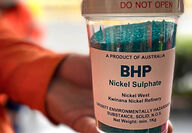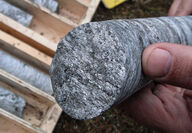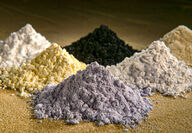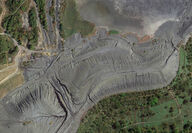Sorted by date Results 1 - 25 of 25

Manganese-rich battery cathode recipes could stretch the other ingredients While not as talked about as other battery ingredients such as cobalt, lithium, and nickel, manganese is an important stabilizing ingredient in the cathodes of the nickel-manganese-cobalt lithium-ion batteries widely used in electric vehicles and electronics. "Their composition helps determine how long you can talk on the phone, how far you can drive an electric car, how fast a battery can recharge and...

Develops strategy to be the world's critical minerals supplier of choice Understanding that the renewable energy and electric vehicle revolution offers a "generational opportunity for Canada and its world-class mining sector," Ottawa is leveraging the nation's wealth of critical minerals to become a powerhouse that feeds raw materials into resource-hungry clean energy and technology supply chains. "Canada's Critical Minerals Strategy will position Canada as the global supplier...

Coming together to build North America's clean energy and e-mobility future The shift away from the fossil fuels that powered the Industrial Revolution and transported humankind through the 20th century, and toward the clean energy technologies that will propel us into the future, has the world at an inflection point – the decisions we make on how to supply, use, and recycle the minerals and metals that are the basic building blocks of the Renewable Energy Revolution will s...

Lack of domestic critical mineral supplies weakens US clean energy ambitions The White House and lawmakers on Capitol Hill are becoming increasingly aware that a lack of secure supplies of critical minerals and metals may be the kryptonite that weakens America's economy, national security, and clean energy ambitions. "The more we dive into this topic of critical minerals, the more I'm certain Superman isn't the only one who can be brought to his knees by rare minerals,"...

Replacing this oft-maligned lithium-ion battery metal comes at a cost Traditionally a headline-grabbing metal due to the perceived human rights and monetary costs it adds to lithium-ion batteries and the electric vehicles they power, cobalt is being overshadowed by the enormous demand and price increases for the lithium and nickel that also go into the storage cells that deliver the "E" to the EV revolution. Cobalt, however, continues to be a vital ingredient that improves...

Rare earth elements suffer from a crisis of identity. Often referred to and treated as one commodity, REEs are actually a group of 15 elements – each with its own individual and seemingly magical qualities. "There are literally hundreds of uses for rare earths – they are unique materials, almost alchemistical magic," said Michael Silver, CEO of American Elements, a Los Angeles-based distributor of rare earths and thousands of other advanced materials. The almost mystical pro...

Flow batteries a major potential future use of alloying metal Vanadium, a metal best known for its role in making extremely tough steel used in tools and auto parts, is emerging as a metal that could allay shortages of lithium, nickel, and other ingredients needed for the batteries powering electric vehicles. While vanadium flow batteries will not be powering EVs anytime soon, this technology could diversify energy storage by serving as an alternative to lithium-ion batteries...

Tesla and other automakers clamor for nickel suppliers with low CO2 footprint Tesla CEO Elon Musk's 2020 appeal to "please mine more nickel" served as a rallying cry for mining companies with projects positioned to deliver this critical battery metal into global markets. Going into 2022, however, the electric vehicle trailblazer's words were echoing in nearly empty warehouses as the lithium-ion batteries that power EVs are demanding more nickel than global miners can supply....

Supply, demand, and risks to the US supply chain define criticality Metaphorically speaking, critical minerals are not set in stone. Instead, the criticality of these basic building blocks of modern society shifts with the demands for any given mineral, the ability of the mining sector to keep pace with that demand, and the geopolitics of where that supply comes from. "Mineral criticality is not static, but changes over time," said Steven Fortier, director of the National...

Electric Vehicles require six times the minerals than their fossil fuel forebearers With even the most basic models boasting sophisticated driver-assist, navigation, infotainment, diagnostics, and other advanced digital systems being fed power from oversized versions of the lithium-ion batteries found in your laptop or smartphone, electric vehicles are becoming personal computers that you can drive. While this puts a whole new spin on the term mobile computing, riding around i...

General Motors, Stellantis, and Tesla moving further up battery supply chain With the batteries powering the electric vehicle revolution demanding more lithium than miners can produce, the price of this lightest metal in the universe rocketed more than 1,000% over the span of two years. This has prompted automakers such as Tesla and General Motors to become more directly involved in the mining and refining of the lithium-ion battery namesake. "Price of lithium has gone to...

By 2030, batteries will likely need more than 5x all the graphite mined in 2021 While shortages of the lithium and nickel needed for electric vehicle batteries has dominated news headlines over the past year, the massive demand for graphite has largely been overlooked. As the primary ingredient in the anode side of lithium-ion batteries, graphite is the single largest element in lithium-ion batteries and the mining sector's inability to keep pace with skyrocketing demand of...

Critical minerals can be recycled from decades of e-waste The necessity of reclaiming waste as a means to curb the seemingly impossible material requirements of a renewable future is fostering a different kind of industry – urban mining. "When you're in the renewable energy space, you've got to think through the whole lifecycle – where will EV and lithium-ion batteries go when they are no longer useful? It can't be to a landfill. That's not responsible," said Graphite One Pres...

US invests heavily into developing domestic rare earth element processing plants Despite what their name suggests, rare earths are not all that scarce. An efficient and environmentally sound technology capable of separating this tightly bonded group into the 15 individual elements of innovation, however, is truly unique and the key to establishing a rare earths supply chain in North America. There are currently no commercial-scale rare earths separation facilities in North...

Magnet rare earths transform motion to energy; and energy to motion and music While all 15 of the rare earths have special properties that have been called magical, alchemistical, and futuristic, seven of these elements are imbued with a powerful magnetism that is hard to resist when it comes to creating a high-tech future powered by clean energy. The magnetic qualities of these rare earths – praseodymium, neodymium, samarium, gadolinium, terbium, dysprosium, and holmium – are...

From flashlights to supercomputers, tin is the glue for an electronic age Lost in the clamor for lithium, nickel and other metals needed for the batteries powering electric vehicles and modern electronics, or the rare earth elements that turn stored energy into motion, is the enormous need for a much more modest metal that is so fundamental to the advancement of technology that it almost goes unseen – tin. While other technology metals are critical to certain products and s...

Shining a light on a metal used in nearly all today's economic sectors Used in everything from beer cans to spacecraft, aluminum is a metal most people interact with nearly every day. What many people don't know is this lightweight metal is also a candidate for next-generation rechargeable batteries with the potential to outperform the lithium-ion cells in use today. The major uses for aluminum metal are generally found in: • Transportation – automobiles, aircraft, tru...

Coal ash, acid drainage, and tailings for future green economy As the world continues to prime itself for the global energy shift, academia, governments and the private sector are scrambling to extract the valuable minerals and metals necessary to power the low-carbon renewable future – resulting in some truly innovative and unconventional methods. In addition to the rare earths, cobalt, lithium, and other technology metals that capture headline attention, this list often miss...

Rare metalloid is key element of CdTe thin-film solar cell tech The rising popularity of thin-film solar cells as a highly effective means of converting sunlight into electricity is creating increased demand for tellurium, amongst the rarest of the stable elements on the periodic table. Tellurium is a metalloid, one of seven elements with properties that fall between metals like aluminum and tin and non-metals like carbon and phosphorus. These semimetals, which also include...

Russia and China's control of global supplies worry DC lawmakers From its uses in flame retardants that have saved countless American lives to being an important ingredient in batteries poised to be the answer to the challenge of storing intermittent renewable energy, few metals are more critical to the national security and economic wellbeing of the United States than antimony. Described as a metalloid, which means it falls somewhere between metals such as zinc and solid...

Tungsten could be held ransom unless domestic mines open Tungsten, or wolfram, is the 74th element on the periodic table of elements and, like many other metals that have found their way onto critical mineral lists in Canada, Europe, and the United States, this sturdy metal is vulnerable to supply disruption. Tungsten has been known since prehistoric times, and as far back as 350 years ago, Chinese porcelain makers were using this element as a pigment to incorporate a unique...

Superconductors, super magnets, and superalloys, this metal is super The stories behind the discovery of many elements in the periodic table make for a fascinating read, but perhaps top among them should be the 41st element, a shiny, white metal known as niobium – for its story spans over centuries, with twists and turns befitting even the best piece of fiction. Due to the astute observations of Charles Hatchett, a self-educated scientist and analytical chemist, niobium was d...

CO2 scrubbing liquid-metal catalyst is tech metal's latest amazing property From making smartphones smarter to transforming troublesome carbon dioxide into useful oxygen and high-value carbon products for batteries and other advanced products, gallium is an amazing tech metal lending its incredible qualities to high-performance computers, telecommunications, national security, and the environment. A soft silvery metal that will turn to liquid in the palm of your hand due to...

Tech metalloid boasts superior semiconductor, optical qualities From NASA's Gateway space station that will serve as a critical outpost circling the Moon to more down-to-Earth applications such as quantum computers that are millions of times faster than their classical counterparts and fiber optic cables that send data at the speed of light, germanium is among the techiest of the tech metals. "The extensive use of germanium for military and commercial applications has made it...

A blue-collar metal that is vital to weatherizing envisioned green energy future Critical minerals are typically thought of as obscure rare earth elements cloaked in geopolitical intrigue, or exciting metals and metalloids that have risen to stardom due to the special properties they bring to cutting-edge technologies such as quantum computing, smartphones, renewable energy, and electric vehicles. Zinc – a blue-collar metal better known for galvanizing guardrails, light p...